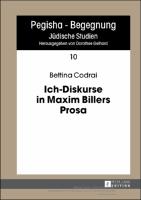Ich-Diskurse in Maxim Billers Prosa
Abstract
Das Buch hat die Darstellung deutsch-jüdischer Identität in ausgewählten Prosatexten des zeitgenössischen, deutsch-jüdischen Autors Maxim Biller zum Thema. Seit 1989 ist jüdisches Leben in Deutschland «sichtbarer» und heterogener geworden. Das liegt maßgeblich an der veränderten Selbstrepräsentation vieler jüngerer Juden. In und mit seinen Texten <I>Der gebrauchte Jude </I>(2009), <I>Esra </I>(2003), <I>Die Tochter </I>(2000) und seinen Kurzgeschichten (1990/1994) bricht Maxim Biller – der kontroverseste Vertreter der sogenannten Zweiten Generation – mit den Tabus, die den Diskurs über deutsch-jüdische Identität nach wie vor bestimmen. Wie, warum und mit welchen Effekten er das macht, analysiert die Autorin mithilfe von Michel Foucaults Diskurstheorie und Judith Butlers Theorie der Performativität.
Keywords
Billers; Codrai; Diaspora; Diskurse; Diskurstheorie; Maxim; Negative Symbiose; Performativität; Prosa; Zweite GenerationDOI
10.3726/978-3-653-05046-2ISBN
9783653975741;9783631657539OCN
1082959183Publisher website
https://www.peterlang.com/Publication date and place
Bern, 2015-08-14Series
Pegisha – Begegnung / Pegisha – Encounters, 10Classification
Literary studies: postcolonial literature
Communication studies
History and Archaeology
21st century, c 2000 to c 2100
Society and culture: general


 Download
Download